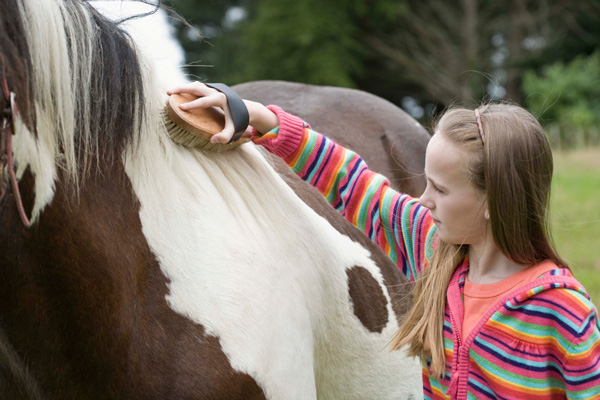
For those of you who work with kids and horses, this research will come as no surprise to you. Three years ago the National Institutes of Health offered the challenge—and funding—to researchers to look into the effects of human-animal interaction on child development.
At Washington State Universioty, Patricia Pendry, PhD, and colleagues received an NIH grand and performed a study entitled “Randomized Trial Examines Effects of Equine Facilitated Learning on Adolescents’ Basal Cortisol Levels.” This study looked at the stress hormone cortisol in children from fifth to eighth grades when they were or were not included in a weekly session with horses.
Following is information from the study, which was published in the American Psychological Association’s Human-Animal Interaction Bulletin.
“Although equine facilitated programs have gained in popularity over the last decade, virtually nothing is known about the causal effects of equine facilitated interventions on human development and well-being. Researchers conducted a randomized trial to determine the effects of an 11-week equine facilitated learning program on the activity of the Hypothalamic Pituitary Adrenal (HPA) axis of fifth through eighth graders through salivary cortisol levels. Children (N = 131) referred by school counselors and recruited from the community were randomly assigned to either an experimental (N = 53) or waitlisted condition (N = 60). Six samples of salivary cortisol were collected in participants’ own home over two consecutive days at pretest, and another set of six samples were collected at post test in both groups of children. Children in the experimental group who participated in a series of once-weekly, 90-minute sessions of equine facilitated activities had lower afternoon cortisol levels and lower total cortisol concentration per waking hour at post test, compared to waitlisted children. Multivariate regression analyses showed that program effects were independent from baseline levels of child cortisol, child gender, age, and referral status.”
For those of you who teach lessons to children, here was the schedule of lessons used in the research.

The research conclusions were interesting and made three points about how this research relates to real-world activities.
“First, the experimental nature of these findings gives greater credence to the claim of therapeutic horsemanship professionals, participants, and parents who have reported significant positive effects of equine facilitated activities firsthand.”
“Second, this study suggests that equine facilitated learning programs may serve as viable alternatives to afterschool programs focusing on athletic or academic achievement, providing afterschool opportunities to children with different interests and needs.”
“Third, while this is only the first step in more fully understanding our ability to alter HPA activity of adolescents through the use of preventive interventions, the effect of a relatively short-term EFL program on diurnal HPA activity may serve as the impetus to conduct research on effects of EFL in other populations, including children with a history of stress exposure or those with diagnoses of stress-related adjustment issues, as well as closer examination of potential mediating variables, underlying program effects.”
To read the complete study visit the American Psychological Association’s Human-Animal Interaction Bulletin.



